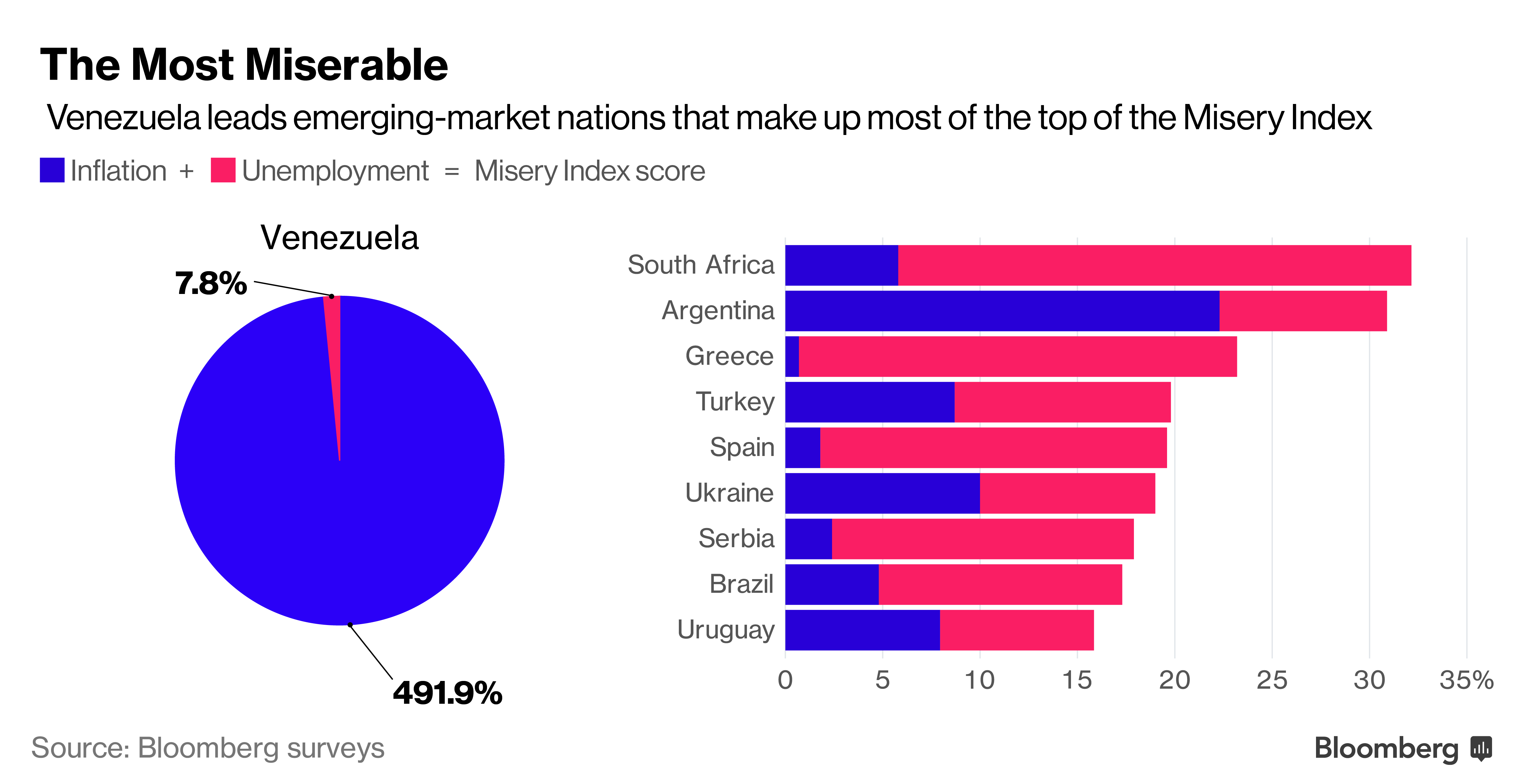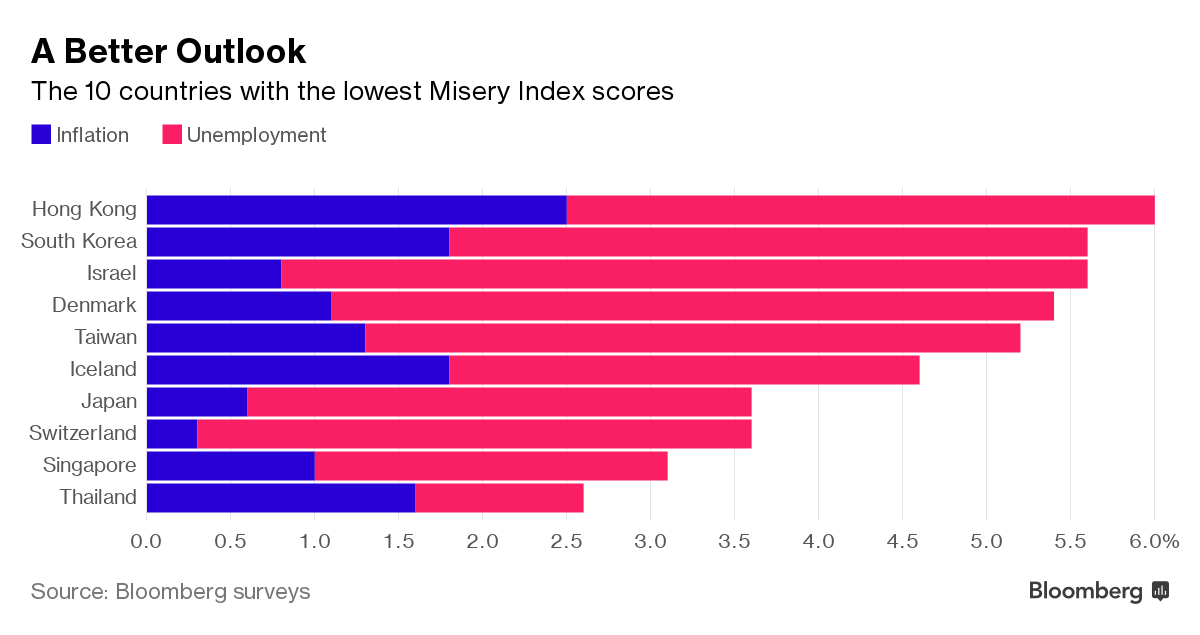Misery in Venezuela is Off-the-Charts. Literally.
Persistent high inflation is a problem every other country in the world has figured out how to solve: that's one key reason why Venezuela stands alone atop Bloomberg's Misery Index.


Ever wonder why Venezuelans, such as the poor lady in this picture, have been jumping ship en masse for the last couple of years, sometimes preferring to live as derelicts in Bucaramanga rather than spend another day struggling in the country? Bloomberg just weighed in with its newest update of the Misery Index, showing that our dear nation just won a triple crown of massive, humanitarian-crisis-inducing economic disaster.
The Misery Index is a simplified macroeconomic indicator, developed by the late Arthur Okun. Simplicity is its virtue, as well as its downfall. All it does is add together two key variables: the inflation rate (other things equal, rising prices lead to reduced purchasing power) and the unemployment rate (which is directly related with all key measures of welfare).
By consistently posting the highest inflation rates in the globe, Venezuela has now won the dubious title of World’s Most Miserable Country three years running. Inflation dynamics got out of control amid the crash in oil prices of 2014, which led to frenzied money-printing (dignified via the the IOUS that PDVSA issues the Central Bank.)
The part I like the most about the Bloomberg methodology is that, instead on relying on official backward-looking statistics (which can be either outdated, manipulated or just completely non-existent), the inflation and unemployment figures are an average of a broad survey that includes inflation and unemployment forecasts from Wall Street research firms, local consultancies, ratings agencies, IGOs such as the IMF and the World Bank, etc. This ensures a greater degree of reliability on the figures and a lesser chance of biases in either direction. Besides, I just love when a reputed news agency backed by the global professional community puts newspeak-blurting communist pigs to shame.
Based on the consensus forecast of 492% inflation and 7.8% unemployment, our misery index is sixteen times more miserable than the second most miserable misery-hole’s.
The lower reaches of the Bloomberg index are populated by a bunch of rogues, each with different reasons for its misery.
Uruguay has met some headwinds on its transition away from subsidy-fueled populism. Brazil is struggling to pull out from its worst economic crisis in decades. Spain is renowned for its high structural unemployment, even though it’s currently at seven-year lows. Turkey’s economy is faring poorly amid President Erdogan’s power grab. Greece is, well, doing so bad that Telesur can’t help but feel sorry for them. Argentina is in an uphill battle to turn around its economy. And South Africa sits at a crossroads between the need for structural reform and breaking down to populist nationalism.
None of these comes anywhere near to to dreaming of having a chance of challenging the undisputed world champion and #1 seed, Venezuela: based on the consensus forecast of 492% inflation and 7.8% unemployment, our misery index is sixteen times more miserable than the second most miserable misery-hole’s.
Venezuela’s reading is off the chart. Like actually off the chart: they had to put us on our own, otherwise you’d barely have been able to see the bars for the 2nd through 10th miserable countries:
 We are quickly reaching to the point when Venezuela stops being known for its oil, beauty pageants, baseball and MUNs. Nowadays it seems that Misery Porn is our main (and only) claim to national pride. Oh, and that stupid skier everybody seems to be talking about is making me miserable as heck. But I digress.
We are quickly reaching to the point when Venezuela stops being known for its oil, beauty pageants, baseball and MUNs. Nowadays it seems that Misery Porn is our main (and only) claim to national pride. Oh, and that stupid skier everybody seems to be talking about is making me miserable as heck. But I digress.
But it’s not just the bottom of the pack that should interest us, it’s the top as well. Market-driven economies run by accountable technocrats know how to strike the right balance in the trade-off between inflation and unemployment. They do so through rules-based, dynamically-consistent fiscal and monetary policies and inclusive institutions.
 Not every government on that list is a democracy, but every government on that list has an economic and monetary policy frameworks put in place by people who know wtf they’re doing: they don’t spend money they don’t have or print money out of control, and are successful in making sure all economic actors are playing by the book (including the governments themselves) usually tend to show both low inflation and unemployment. There’s a few outliers, such as Thailand, which show unusually low scores on the Misery Index due to unique ways of calculating the unemployment rate.
Not every government on that list is a democracy, but every government on that list has an economic and monetary policy frameworks put in place by people who know wtf they’re doing: they don’t spend money they don’t have or print money out of control, and are successful in making sure all economic actors are playing by the book (including the governments themselves) usually tend to show both low inflation and unemployment. There’s a few outliers, such as Thailand, which show unusually low scores on the Misery Index due to unique ways of calculating the unemployment rate.
Caracas Chronicles is 100% reader-supported.
We’ve been able to hang on for 22 years in one of the craziest media landscapes in the world. We’ve seen different media outlets in Venezuela (and abroad) closing shop, something we’re looking to avoid at all costs. Your collaboration goes a long way in helping us weather the storm.
Donate




